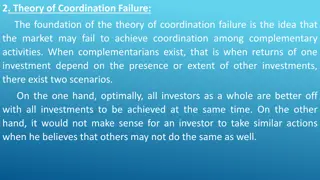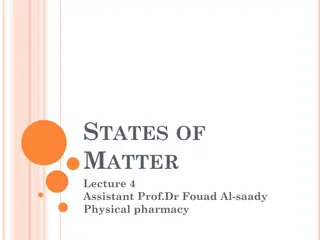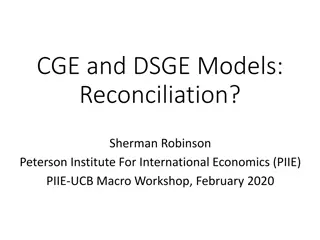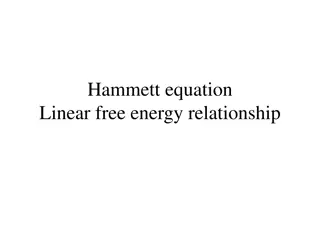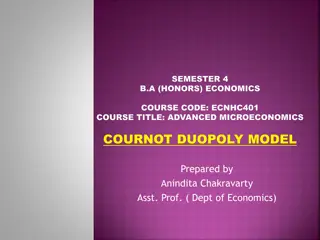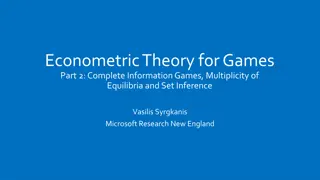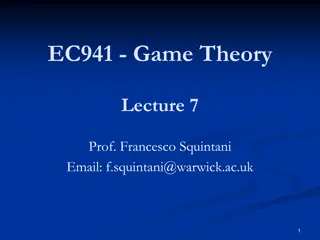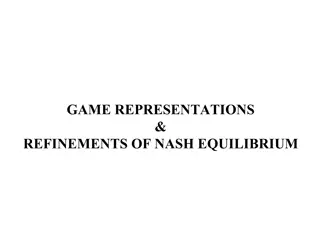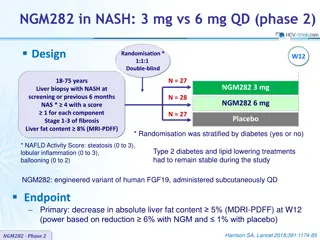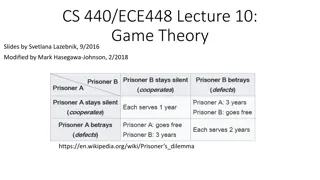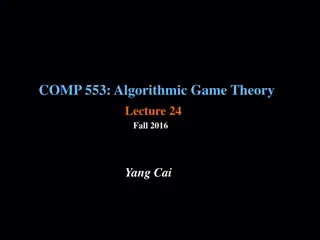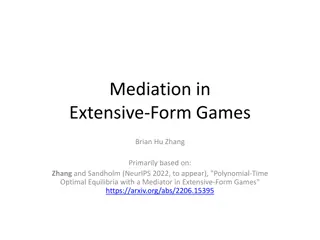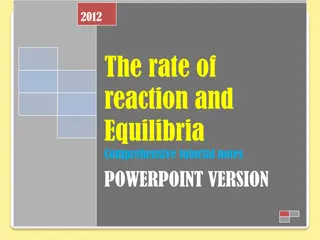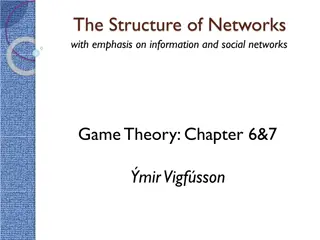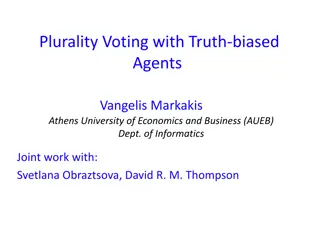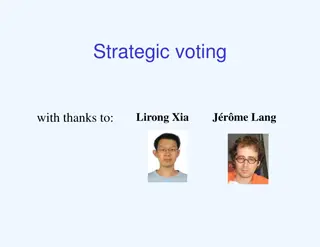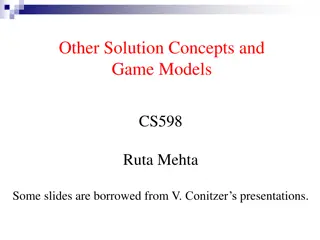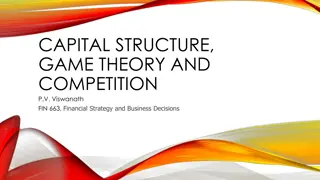Understanding the Basic Principles of Distillation
Distillation is a process used to separate components in a liquid mixture based on differences in vapor pressures. This involves techniques like simple, steam, and fractional distillation, as well as understanding binary mixtures, boiling points, vapor pressures, and vapor-liquid equilibria. Raoult'
5 views • 42 slides
Understanding Chemical Potential and Phase Equilibria in Solution Thermodynamics
The chemical potential and phase equilibria in solution thermodynamics are crucial concepts for understanding the behavior of mixtures at varying compositions and conditions. By investigating the fundamental property relation, partial molar properties, and the role of Gibbs energy, we can grasp how
5 views • 25 slides
Role of Chemistry in Pharmaceutical Sciences
Medicines and drugs used for treating diseases are organic or inorganic chemicals. Studying drug chemistry is essential for pharmacists. This course covers fundamentals of chemistry, states of matter, radiochemistry, thermodynamics, kinetics, and chemical equilibria. Important subtopics include atom
2 views • 35 slides
Understanding the Theory of Coordination Failure in Markets
The theory of coordination failure explores how markets may struggle to achieve coordination among complementary activities, leading to suboptimal outcomes. It highlights scenarios where investors' actions depend on each other, emphasizing the role of government intervention to solve coordination is
2 views • 14 slides
Neonatal Data Collection and Utilization in Quality Care
Dive into the world of neonatal data with Catherine Nash, where the focus lies on the importance of collecting and utilizing data effectively to enhance care standards for babies and families. Discover how data systems like BadgerNet play a vital role in monitoring care, diagnosing treatments, measu
0 views • 7 slides
Crystallization Principles in Chemical Engineering: Understanding Crystal Formation and Purification Methods
Crystallization is a key process in chemical engineering, involving the formation of solid particles within a homogeneous phase to obtain pure chemical substances. This article discusses the principles of crystallization, the importance of crystal size control, equilibria in the process, and the con
1 views • 40 slides
Understanding Phase Equilibria in Physical Pharmacy
Delve into the complexities of states of matter, phase equilibria, and the phase rule as explained by Assistant Prof. Dr. Fouad Al-saady in the context of physical pharmacy. Learn about phase definitions, phases in different systems, and examples illustrating phase differentiation in various substan
0 views • 22 slides
Overview of Cooperative Game Theory and Bargaining Solutions
Cooperative game theory explores situations where players have mutual benefits in cooperating. The focus is on bargaining solutions to reach agreements despite conflicting interests. Key concepts include Nash Bargaining Solution, Kalai-Smorodinsky Bargaining Solution, and Rubinstein Bargaining Proce
1 views • 24 slides
Understanding CGE and DSGE Models: A Comparative Analysis
Explore the similarities between Computable General Equilibrium (CGE) models and Dynamic Stochastic General Equilibrium (DSGE) models, their equilibrium concepts, and the use of descriptive equilibria in empirical modeling. Learn how CGE and DSGE models simulate the operation of commodity and factor
4 views • 15 slides
Understanding the Hammett Equation in Chemical Reactions
The Hammett equation explores how substituents influence the dissociation of benzoic acid, affecting its acidity. By quantifying this influence through a linear free energy relationship, the equation helps predict the impact of substituents on different processes. Through parameter definitions and m
0 views • 9 slides
Understanding the Cournot Duopoly Model in Advanced Microeconomics
The Cournot Duopoly Model, named after Augustin Cournot, is an economic model where competing firms independently choose quantities to produce simultaneously. It strikes a balance between monopoly and competition, resulting in stable Nash Equilibrium. While advantageous, it has limitations due to un
8 views • 5 slides
Understanding the Phase Rule in Physical Pharmacy: Two Component Systems and Equilibrium Phases
The Phase Rule is essential in determining the state of a system based on components and phases. This study explores two-component systems in physical pharmacy, illustrating miscibility behaviors and equilibrium phases through diagrams and explanations. Understanding binodal curves, tie lines, and t
0 views • 12 slides
Econometric Theory for Games: Complete Information, Equilibria, and Set Inference
This tutorial series discusses econometric theory for games, covering estimation in static games, Markovian dynamic games, complete information games, auction games, algorithmic game theory, and mechanism design. It explores topics like multiplicity of equilibria, set inference, and mechanism design
1 views • 23 slides
Women and Gender in the Civil Rights Movement
Women played crucial roles in the Civil Rights Movement, with leaders like Rosa Parks, Ella Baker, Diane Nash, and Fannie Lou Hamer making significant contributions. Behind the scenes, many women undertook activities like organizing and grassroots activism. This resource explores the impact of women
0 views • 10 slides
Recent Applications of Quasi-Poly Time Hardness in Densest k-Subgraph
Recent applications of the Birthday Repetition technique have demonstrated the quasi-polynomial time hardness in various computational problems, including AM with k provers, Dense CSPs, Free games, and Nash equilibria. These applications also explore the potential implications in signaling theory an
0 views • 18 slides
Exploring Limited Randomness in Repeated Games
Dive into the world of randomness in repeated games through this insightful research by Moni Naor, Pavel Hubæk, and Jon Ullman. Discover the significance of randomness in algorithms, equilibria, and finitely repeated games. Explore the necessity of randomness in Nash Equilibrium and the computation
2 views • 28 slides
History of NASH - Setting Standards and Certification in Homeopathy
NASH, founded in 1990, aimed to set competency standards, certify homeopaths, advocate for legality, and gain recognition in the homeopathic community. They emphasized the ability to solve cases effectively, without requiring an exam. Collaborating with the CHC, NASH worked towards higher standards
0 views • 23 slides
Understanding Kinetic Theory of Gases and Thermodynamics
Explore the fundamental principles of the kinetic theory of gases, including the five postulates and the relationship between macroscopic properties and microscopic phenomena. Delve into the concept of entropy and thermodynamics, along with the behavior of ideal and real gases. Gain insights into th
0 views • 116 slides
Game Theory Lecture 7: Repeated Games and Equilibria
Exploring the concept of repeated games in game theory, this lecture covers infinitely repeated games, Nash and subgame-perfect equilibria, strategies, a Grim Trigger Strategy in the Prisoner's Dilemma, and automaton representation. Understanding how interactions evolve over time offers insights int
0 views • 45 slides
Understanding Predator-Prey Interactions: Impacts and Equilibria
Explore the dynamics of predator-prey interactions, including what defines a predator, the impacts predators have on prey populations, and the equilibrium points in the Lotka-Volterra Predator-Prey model. Discover how predation plays a crucial role in regulating population densities and observe the
0 views • 36 slides
Understanding Lotka-Volterra Model in Mathematical Modelling
Explore the dynamics of predator-prey systems through the Lotka-Volterra model, including equilibrium points, behavior around equilibria, linearization, eigenvalue analysis, and classification of equilibria based on real and complex eigenvalues.
2 views • 14 slides
Game Representations & Refinements of Nash Equilibrium
Game representations, such as normal form and extensive form, along with refinements of Nash Equilibrium, are important concepts in game theory. Various games like Rock-paper-scissors are analyzed in terms of sequential and simultaneous moves, as well as imperfect information extensive form games wi
0 views • 22 slides
NGM282 in NASH: Phase 2 Study on Liver Fat Reduction and Histology Changes
A phase 2 study on NGM282 in NASH patients showed a significant decrease in liver fat content, meeting the primary endpoint. Exploratory findings also indicated potential improvements in liver histology. The treatment involved NGM282 at 3 mg QD, with additional rosuvastatin if needed. Promising resu
0 views • 11 slides
NGM282 in NASH Phase 2: 3 mg vs 6 mg QD Randomised Trial
This Phase 2 clinical trial compares the efficacy of NGM282 (3 mg vs 6 mg) versus placebo in patients with NASH. The primary endpoint is a 5% reduction in liver fat content at 12 weeks. Randomisation was stratified by diabetes status, and stable Type 2 diabetes and lipid-lowering treatments were mai
0 views • 6 slides
Understanding Game Theory: Applications and Concepts
Game theory delves into systems of interacting agents where outcomes depend on each agent's actions. Explored in various fields, it helps in agent design and mechanism design for optimal strategies and rule-setting. Topics covered include Nash equilibrium, coordination games, anti-coordination games
0 views • 39 slides
Understanding Brouwer's Fixed Point Theorem and Nash's Proof in Algorithmic Game Theory
Explore the foundational theorems of Brouwer and Nash in Algorithmic Game Theory. Dive into Brouwer's Fixed Point Theorem, showcasing the existence of fixed points in continuous functions. Delve into Nash's Proof, unveiling the Nash equilibrium in game theory. Discover visualizations and constructio
0 views • 23 slides
Mediation in Extensive-Form Games: Polynomial-Time Optimal Equilibria
This content discusses the concept of mediation in extensive-form games based on the work of Zhang and Sandholm. It explores correlated equilibria in normal-form games and the role of a mediator in achieving Nash equilibrium among players. Various game scenarios, strategies, and equilibrium concepts
0 views • 46 slides
Explore the Career and College Promise Program at Nash Community College
Discover the Career and College Promise Program offered at Nash Community College, providing tuition-free college classes to eligible high school students. Gain insights into the academic and financial benefits of the program, eligibility criteria, and the rich history and offerings of Nash Communit
0 views • 24 slides
Role of Solvent in Spectral Properties and Solvatochromism
Solvent plays a crucial role in physical and chemical processes, affecting kinetics, equilibria, and spectral properties such as UV-vis, IR, and NMR. Solvathochromism describes the change in spectral bands caused by solvent interactions. Factors like solvent polarity and hydrogen bonding influence d
0 views • 19 slides
Understanding Learning in Games Seminar
Explore the intersection of Game Theory and Machine Learning in the context of Learning in Games. Discover how decision-makers adapt strategies to maximize their utility, with emphasis on Multi-Agent Learning. Topics include AI for Board Games, Equilibrium Computation in Auctions, and various soluti
0 views • 11 slides
Strategic Communication in Bayesian Persuasion
Understanding the concepts of cheap talk and Bayesian persuasion in strategic communication, where information can be conveyed via direct communication even in the presence of conflicts of interest. Explore how biased senders influence noisy communication, and analyze communication equilibria in sce
0 views • 22 slides
Understanding Chemical Kinetics: The Rate of Reaction and Equilibria
Chemical kinetics explores the rate at which chemical reactions occur and the factors influencing them. This tutorial delves into the concepts of reaction rates, equilibrium, collision theory, and the role of concentration in determining reaction rates. By understanding these principles, industries
0 views • 117 slides
Understanding Equilibria in Populations: Hardy-Weinberg Principle
Exploring the concept of equilibria in populations, focusing on Hardy-Weinberg principles and its implications. The discussion covers allele distributions, genotype frequencies, maintenance of equilibrium across generations, and scenarios where equilibrium may be violated. Key points include basic p
0 views • 58 slides
Understanding Mixed Strategies in Game Theory
Explore the concept of mixed strategies in game theory through examples and insights on Nash equilibrium. Discover how players randomize their actions to create uncertainty and strategic advantages. Learn how mixed equilibria are applied in real-world scenarios and how they contribute to the stabili
0 views • 46 slides
Plurality Voting with Truth-biased Agents
Investigating game-theoretic approaches in voting, this research delves into the complexities of plurality voting with truth-biased agents, exploring Nash equilibria, strategic aspects, and undesirable outcomes. The study aims to provide a more realistic model of voting behavior and decision-making
0 views • 32 slides
Strategic Voting in Sequential Voting Games
Strategic voting in sequential voting games involves voters strategically casting their votes based on information about previous voters' preferences. Various voting rules like Plurality Rule and Borda Rule can result in different outcomes, and the concept of Nash equilibrium is explored. The settin
0 views • 32 slides
Exploring Chirping Mode Dynamics in Tokamak Equilibria
Chirping Alfvén modes in Tokamak equilibria exhibit frequency variation, allowing for maximizing power extraction from fast particles. Investigation of a chirping mode with Hamiltonian-Mapping and analysis of relevant phase-space slices reveal insights into the dynamics, resonance, and density grad
0 views • 41 slides
Game Theory Concepts and Models in Strategic Decision-Making
Exploring various solution concepts and game models in the realm of game theory, this presentation delves into topics such as Nash equilibrium, dominance, dominant strategy equilibrium, mixed strategies, and iterated dominance. It discusses how players decide on particular equilibria, possible solut
0 views • 39 slides
Understanding Capital Structure, Game Theory, and Competition in Financial Strategy
Exploring the concepts of capital structure, game theory, and competition in financial decision-making. Discusses equilibria, information asymmetry, and the relevance of game theory in predicting outcomes. Provides an example scenario involving outside equity and differential information to illustra
0 views • 57 slides
Equilibrium and Acid-Base Problems in Chemistry Lecture
In this lecture, topics such as Advanced Equilibrium, Acid/Base Equilibria, Systematic Method for solving chemical problems, Strong Acid/Strong Base scenarios, and General Comments on reactions are discussed. Examples using the systematic method are provided for practical understanding. Key points o
0 views • 13 slides



